PROMOTING AND PROTECTING CHILDREN’S RIGHTS WORLDWIDE

ANNUAL REPORT 2021-2022
The

International Bureau for Children's Rights
(IBCR) is an international non-governmental organisation based in Canada that has been promoting and protecting the rights of the child for more than 30 years in nearly 50 countries across Africa, the Americas, Asia and the Middle East.
© AdobeStock / BlueOrange Studio
Cover photo © Freepik / Drobotdean
OUR VISION
A world in which every child enjoys rights equally and in all circumstances.
WHAT WE DO
Projects all over the world: Implementing short-, medium- and long-term initiatives to improve child protection and children's rights in a comprehensive and sustainable manner.
Campaigns advocating for change: Sharing our messages and vision with institutions and governments.
International volunteering: Strengthening the capacity of our partners in 11 countries and contributing to improving the protection and respect of children's rights in these countries.
OUR APPROACH
LISTEN to local partners and work with them to develop innovative solutions that are respectful of children’s rights and based on existing processes
STRENGTHEN the capacities of frontline workers to address issues affecting children
PROMOTE active participation from all stakeholders, including children
ENGAGE individuals, communities and institutions so that they become agents of change
FOSTER collaboration between the various professionals involved in youth protection
SUPPORT and CHAMPION reforms, action plans and legislation in favour of children’s rights
OUR GUIDING PRINCIPLES based on the Convention on the Rights of the Child
› Systematic consideration of the best interests of the child

› Non-discrimination
› The right to life, survival and development
› Children’s right to participation and freedom of expression
The IBCR at a glance
4 OFFICES worldwide
More than 30 YEARS OF OPERATION
Nearly 50 COUNTRIES IMPACTED by our actions
The rights of more than 2,9 MILLION CHILDREN are now better protected thanks to our initiatives
Approximately 60 PERMANENT EMPLOYEES

More than 5,500 CHILDREN CONSULTED during our projects
More than 66,000 PROFESSIONALS trained on children's rights
4 • IBCR ANNUAL REPORT • 2021-2022
© AdobeStock / Kalim

IBCR ANNUAL REPORT • 2021-2022 • 5 Table
contents Foreword This year's highlights Renewed efforts to protect children’s rights The IBCR’s reach and impact For Children's rights: Everyone has a role to play! Our projects around the world Our national initiatives for change Financial information Our valued Partners Our dedicated team 6 8 10 30 20 2 4 67 68 1 4 70
of
A need for adaptability

When a situation becomes unstable, children's rights are often compromised before anything else. The past year is a good example. With the ongoing pandemic, resurgence of armed conflicts, increased incidence of natural disasters caused by climate change and growing numbers of migrants, instability is becoming the norm. For this reason, each country must have a solid child protection system that can adapt to changing circumstances.
In our everyday work on projects and with our partners, we see that children experience a wide range of situations and their rights can be violated in diverse ways. To address these issues and ensure that children's rights are respected, regardless of the situation, child protection systems must be able to adapt and children must be given the opportunity to play a bigger role.
The first step is to make the system adaptable by developing the skills of the people who make it up. 2022 marks the end of a decade spent analysing, defining, and structuring core competencies for different professions and services within child protection systems, a process carried out in collaboration with hundreds of specialists. The IBCR believes that using a competency-based approach is the key to strengthening and adapting child protection systems. By developing the right competencies, each person becomes able to uphold children's rights in their professional practice, including in new or unfamiliar situations. This approach ensures that services are adapted to the reality of the children involved. It also promotes multi-sector collaboration to ensure that children are protected in all circumstances.
The next step is to create conditions allowing children to pay a bigger role in defending their rights. This is in line
6 • IBCR ANNUAL REPORT • 2021-2022
© AdobeStock / oksix
with our strategic objectives for 2024 and in accordance with the Convention on the Rights of the Child. In order to achieve the IBCR's vision—a world where every child enjoys their rights equally in all circumstances—we need to go beyond protection and focus on prevention, and children must play a key role in this. All too often, children are perceived as vulnerable and in need of protection, but in fact they are full subjects of the law who are capable of expressing their opinions and taking action to ensure their rights are respected.
Through our projects, particularly those in Burkina Faso, Senegal and Quebec, the IBCR is working to inform, mobilise and equip children so that they can take action. We're also working to make sure they have the space to do so, and that their points of view are taken into account by the adults around them. This is a major departure from the traditional view of children in our societies. This way of working is used in our Voices of Youth (Parole aux jeunes) project in Quebec by allowing children to influence the strategies developed to prevent and combat child sexual exploitation.
These approaches are central to everything we do—in Honduras, Costa Rica, Canada, Madagascar, Tunisia, Burkina Faso, Senegal and more countries to come—in order to advance children's rights around the world.


Our organisation is growing faster than ever before, allowing us to expand our initiatives aimed at defending and promoting children's rights. This growth is thanks to you. We're grateful to all of you who take the time to read this annual report, support the IBCR's mission, follow our work and share our messages. The changing world calls for constant adaptation. Together, let's continue to work together to rise to the level of children!

IBCR ANNUAL REPORT • 2021-2022 • 7
Martin Causin, Director General, International Bureau for Children’s Rights (IBCR)
Théophane Nikyèma, Chairman of the Board of Directors, International Bureau for Children’s Rights (IBCR)

8 • IBCR ANNUAL REPORT • 2021-2022
© Rawpixel
This year's highlights
The IBCR took action in 12 countries in Africa and the Americas.
567 children
have participated in our projects.
60,378 children have benefited from the actions carried out within our projects.
A total of
100,760 people have been sensitised, equipped or trained through our projects, including at least 25,940 women.
54 employees, 16 interns and 26 volunteers actively contributed to our projects.
104 awarenessbuilding, development and training workshops were held on topics such as children's rights, gender equality, sexual and gender-based violence, children in conflict with the law, organisational management, communication and monitoring, evaluation and learning.
In
Honduras,
2 community projects
were supported to better protect populations against human trafficking and to guarantee them a life free of violence and discrimination (more information on page 41)

IBCR ANNUAL REPORT • 2021-2022 • 9
Renewed efforts to protect children’s rights

215 children and a few hundred thousand more
For over a century, hundreds of thousands of First Nations, Inuit and Métis children were violently removed from their families and communities across Canada and sent to residential schools. This year, some grisly discoveries were made, with hundreds of graves found near some of these schools, sparking outrage among the Canadian public. Unfortunately, this is just the visible tip of a much bigger problem that dates back more than 100 years and persists today: the violation of the fundamental rights of all those children.
The IBCR published a press release to remind the Government of Canada of its obligations and to stress the work that remains ahead of us to safeguard Aboriginal children's rights to health, education, protection, participation, cultural freedom and identity.
Justice must also be served so that the children of today can learn about their history and benefit from reconciliation. In addition, reporting mechanisms must be established and made available to children and families.
Child labour: Where are we at?
It's estimated that 160 million children work worldwide, often forcibly and in hazardous conditions, which can be detrimental to their health and development. This number has been rising in recent years, prompting the UN to designate 2021 as the International Year for the Elimination of Child Labour. In June of that same year, the IBCR moderated a virtual conference organised by the Greater Montreal branch of the United Nations Association in Canada (UNA-Canada).
Approximately 40 people attended, learning about child labour, its various forms and how the issue was exacerbated by the pandemic. The discussions also covered migration issues and the importance of child-rights training for all those who interact with children in the course of their work.
10 • IBCR ANNUAL REPORT • 2021-2022
The group also discussed the need for effective protection systems that ensure all children have access to health and education services and that can identify and punish employers who use child labour. Governments around the world need to make a serious effort to reduce and prevent child labour for the long term.
Focusing on care and prevention in Quebec

Once again this year, the IBCR participated in the Grande semaine des tout-petits in Quebec by co-signing an open letter with the Collectif petite
enfance, the group behind this initiative. The letter emphasised the importance of prevention and the need for caring communities to protect young children. It also mentioned the need to follow up on the recommendations made by the Laurent Commission (see our previous reports) on child protection in the province.
Prevention was a central theme in this year's message. It's an essential prerequisite for healthy and harmonious family relationships and for reducing or eliminating the factors that put child wellness at risk. Having strong communities bolstered by mutual support and collective action can help ensure that as many children as possible grow up in homes free of violence, abuse and neglect.
The annual event aims to give a voice to Quebec's youngest citizens and make early childhood a leading social priority.

By working together, we can build the caring community they so desperately need.
- Collectif petite enfance
IBCR ANNUAL REPORT • 2021-2022 • 11
©
Tina Taphouse via Twitter @ttaphouse
Children aren't just tomorrow's adults, they're today's citizens
In the fall of 2021, the International Bureau for Children's Rights published an article in Droits & Liberté, a journal that focuses on human rights. The article discussed the importance of child participation and served as a reminder that children shouldn't be viewed as vulnerable beings requiring protection; rather they must be considered as fully capable actors who can actively promote and defend their own rights. Child protection systems must support their right to participation by creating spaces and processes that give children the chance to participate in decisions that affect them.

"The right to be heard (also known as the right to participate) is one of the key principles set out in the Convention on the Rights of the Child. This right implies that all children, regardless of their ethnicity, gender, religion or socio-economic status, can express their opinions and be fully involved in promoting their rights in their daily lives. Children have the right to participate in the debates and decisions that concern them, as well as in decisions concerning broader social issues or current affairs. Adults and institutions therefore have the duty to give children the opportunity and space to be heard."
- Excerpt from the article
The full article is available at www.ibcr.org/en
World Congress to promote equitable justice for and with children


This year, the IBCR has renewed its collaboration with Justice With Children by participating in the initiative's World Congress. Held every three years, this congress brings together children, politicians, legal experts, academics and members of civil society. It aims to address current issues related to children in contact or conflict with the law, while influencing the juvenile justice field, exploring best practices, encouraging scientific cooperation and raising awareness of child-friendly justice.
With access to justice for all children as its central theme, the 2021 edition covered the need to reduce
12 • IBCR ANNUAL REPORT • 2021-2022
discrimination, particularly when it compromises access to justice and quality services, as well as the need to ensure that all children are treated equally. The IBCR attended and hosted two workshops on the day dedicated to sub-Saharan Africa. The workshops addressed the topics of child participation and capacity building for personnel working within the child protection system, especially those in the justice sector.
During the congress, a scientific committee was created to finetune the strategies for training, research and advocacy that were proposed during the various discussions. Théophane Nikyèma, chair of the IBCR's board of directors, member of the African Committee of Experts on the Rights and Welfare of the Child and Special Rapporteur on Children in Conflict with the Law, as well as Luis Pedernera, member of the IBCR's board of directors and chair of the United Nations Committee on the Rights of the Child (2017-2021) sat on the committee, acting as member and chair, respectively.
What makes the congress important is its international scope. The recommendations and best practices that emerge from the discussions will be shared widely, benefiting children in contact with the justice system.
 - Théophane Nikyèma, chair of the IBCR Board of Directors and member of the Justice With Children Scientific Committee
- Théophane Nikyèma, chair of the IBCR Board of Directors and member of the Justice With Children Scientific Committee

UN-Secretary General's message on child rights and armed conflict
Every year, the Secretary-General of the United Nations submits a report to the UN Security Council on children in armed conflict. Appended to this report is a list of all the organisations or governments in conflict that have committed serious child rights violations. This list should reflect the situation in each area where conflicts are ongoing, based on information gathered through the United Nations' own mechanisms. However, numerous irregularities have been noted over the past several years. Some actors responsible for serious violations have been left off the list and, what is worse, others have been removed even though they haven't met the required conditions.
The IBCR wants to see this change and ensure that no violation goes unpunished. That's why, every year, we add our voice to a group of human rights organisations calling for the list to include all of the parties that are involved in armed conflict and that are responsible for grave violations of children's rights. As these repeated calls have been unheeded, the IBCR is committed to continue raising awareness of the issue until these practices change. l
IBCR ANNUAL REPORT • 2021-2022 • 13
© AdobeStock / NOBU
© Freepik / senivpetro

14 • IBCR ANNUAL REPORT • 2021-2022
© AdobeStock / yanadjan
The IBCR’s reach and impact
269,325 webpage views, for a total of 208,936 visits
6,307 new subscriptions
to our newsletter and social media accounts, for a total of 17,501 subscribers
419 social media posts
seen 369,186 times, shared 511 times generating 5,630 reactions
36 topics
addressed in our social media posts
6 child-rights advocacy initiatives

27 posts on gender equality on our social media accounts and website
9 online and inperson events
organised or co-organised by the IBCR, and
7 child-rights events involving the IBCR, with more than 980 people attending
to draw attention to issues such as the rights of children in armed conflict, the value of South-South cooperation, and the need for Canada to acknowledge its violations of Indigenous children's rights and the need to protect, compensate and provide justice for Indigenous communities so that these children can finally exercise and enjoy their rights
5 media mentions about the IBCR and its projects in the organisation’s target countries
IBCR ANNUAL REPORT • 2021-2022 • 15
New campaign: "Children's rights: Take Action Today!"


This year, the IBCR launched an awareness-building campaign on our collective responsibility to create an environment where child rights are safeguarded. The campaign also illustrates the everyday things we can do to uphold and protect the rights of children.

The campaign officially launched on November 20, World Children's Day, at a twoday in-person event—the first of its kind since 2019!—which also included a virtual exhibit, video and other materials de -
veloped to inform the general public about the role that each individual plays in promoting and defending children's rights.

More than 70 people came to the Montreal's Maison du développement durable to see the exhibit and a display showcasing the IBCR's work in defending children's rights around the world.
Additional information about the campaign is provided on page 20.
16 • IBCR ANNUAL REPORT • 2021-2022
© pexels / cottonbro
Visual of the awareness campaign (left) and two visuals of advertisements published in the Quebec press.
Increased coverage in the Quebec media
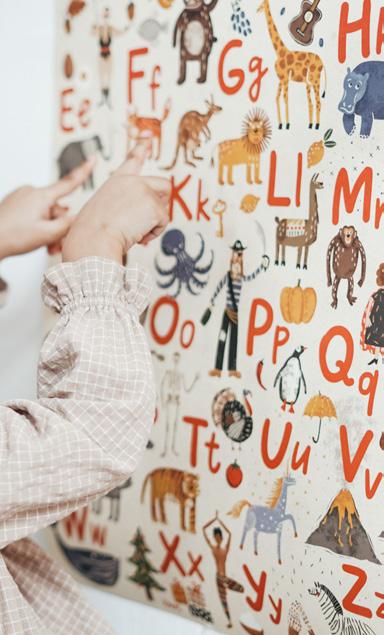
To support our volunteer cooperation programme—known as PRIDE, which stands for Project for the Integral Reinforcement of Children's Rights—the IBCR decided to increase its print and digital media visibility by running two ad campaigns in Le Devoir The ads were posted during Quebec's days of international solidarity (Journées québécoises de la solidarité internationale, or JQSI) in November 2021 and Sustainable Development Week in February 2022. The goal was to promote international volunteering opportunities offered by the IBCR and related topics like the decolonisation of international cooperation and child participation in the defence and promotion of their rights.
Thematic talks on key issues
This year, the IBCR launched a new series of thematic talks. Two online sessions with nearly 100 participants were organised to discuss the African Charter on the Rights and Welfare of the Child and South-South cooperation.

The round table discussions included guest specialists from different countries that the public could engage with, allowing them to gain a better understanding of important issues related to child rights. Such talks will be regularly held in the years to come. The sessions may be in-person or online, depending on the theme and public health measures.

IBCR ANNUAL REPORT • 2021-2022 • 17
Annual Conference of International Volunteer Cooperation Organisations — Virtual Edition
The IBCR participated this year in the annual conference of the International Volunteer Cooperation Organisations (IVCO). As an exhibitor, a virtual booth showcasing the organisation and its volunteer cooperation programme PRIDE was operated, allowing the IBCR to engage with many people during the 4-day conference.
The theme of IVCO 2021 was Inclusive Volunteering for Global Equality and was framed by three sub-topics: decolonisation, digitalisation and directionality. The discussions examined inclusivity in volunteering for development, including all of its forms and the groups impacted by development initiatives.
Every year, the IVCO event brings together volunteer cooperation organisations, as well as members of the public, private, academic and NGO sectors from around the world. Together, they discuss key issues affecting volunteering, share innovative approaches and build alliances.
2022 CONFERENCE FOCUSED ON A NEW ERA FOR VOLUNTEERING FOR DEVELOPMENT

After two years of virtual events, the 2022 IVCO conference will be offered in a hybrid format from October 16 to 19, 2022. The in-person event is happening in Saly, Senegal, and some of the meetings and workshops will be available online as a video playback. The conference, which will be organised by the IBCR and Carrefour international, will focus on the new forms of international volunteering that emerged after the pandemic and the associated challenges.
As the world slowly emerges from most widespread pandemic of recent times, the conference will explore different models of volunteer cooperation, as well as new approaches to international development, such as leveraging volunteers from the global south and using their knowledge to achieve the United Nations' 2030 Sustainable Development Goals.

18 • IBCR ANNUAL REPORT • 2021-2022
© Freepik
One week "for a better world"
Every February, Canadians are invited to celebrate International Development Week (IDW), an initiative that highlights Canada's international development efforts. This year, the IBCR and the other organisations in the volunteer cooperation programme marked IDW with a social media campaign featuring the work done by Canadian volunteers around the world to build egalitarian environments where human rights are respected.
This year, IDW focused on the themes of gender equality, health, economic resilience, education and climate action, aligned with the Sustainable Development Goals (SDGs) of the United Nations 2030 Agenda. The SDGs call for thinking about how to build resilient, inclusive, and sustainable societies and economies that benefit all people, while protecting the planet. l

IBCR ANNUAL REPORT • 2021-2022 • 19
Visual of the 2022 IDW ©Global Affairs Canada u
IN FOCUS FOR CHILDREN'S RIGHTS
20 • IBCR ANNUAL REPORT • 2021-2022
People often think you need special qualifications to defend and promote children's rights, but it's something we can all do through our everyday actions! Regardless of whether a person is in contact with children at work, at home or during their free time, each of us has the power to give children the chance to live, grow and develop in the best possible conditions.
This is the key idea behind a special public awareness campaign entitled "Children's Rights: Everyone has a role to play," which the IBCR launched this year and plans on running for several more. The campaign includes a pamphlet, physical exhibit, virtual exhibit, special events, videos, advertisements and other media. Addressing Canadians of all ages, it encourages a collective movement to support children's rights and generate meaningful and lasting change.

The campaign suggests 11 actions that require varying skill levels and time commitments:
1. Learn about the topic to gain a better understanding of the issues.
2. Be active on social media by reacting to posts and sharing content to build awareness and mobilise others.
3. Create topical content such as blog posts, articles and podcasts with the aim of informing and engaging a wider audience.
4. Hold or participate in engagement or outreach activities such as conferences, meetings, forums, workshops and round-table discussions in order to draw attention to child rights issues.
5. Organise or participate in online or in-person fundraising events such as charity drives, charity dinners, food and beverage sales, auctions and social media campaigns to mobilise your network and support organisations that support the cause.
IBCR ANNUAL REPORT • 2021-2022 • 21
© AdobeStock / Lightfield Studios
6. Support community organisations or agencies working in the field of children's rights by making one-time or regular financial contributions or donations in kind, skills or services.
7. Engage in advocacy and make decision makers (politicians, business leaders, etc.) aware of current challenges affecting children's rights and possible solutions.
Advocacy [noun]: the act or process of supporting a cause or proposal. Advocacy can take many forms, including petitions, demonstrations, conversations and letters, and be collective or individual.
8. Change your practices by being attentive to the rights of the children in your surroundings, questioning whether they should have input in the decisions that concern them, and becoming aware of the stereotypes that could negatively impact their development.

9. Volunteer to support community organisations or agencies in their activities throughout the year.
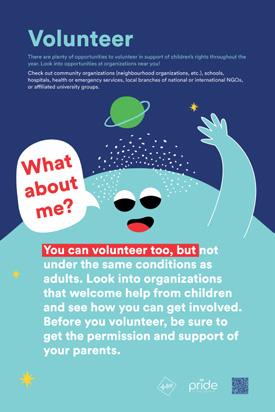
10. Engage in internal volunteering, through a process also known as volunteer cooperation, and join Canadians of all ages and backgrounds in another country for a few weeks or several months to support local organisations and the communities they serve.
Additional information about PRIDE, the IBCR's international volunteering programme, is available on page 52.
11. Study or work in a field related to children's rights and dedicate your life's work to this important cause. Students and professionals have the power to make a difference and ensure that each child has the chance to grow up and thrive in a supportive environment.
22 • IBCR ANNUAL REPORT • 2021-2022
Each of these proposed actions can be adapted to children, taking into account their ages and life circumstances. The campaign was designed to engage adults and children alike, using appropriate language, in order to gain broad support for children's rights and to emphasise the importance of giving children the opportunity to participate in the promotion of their own rights.


The campaign is available on the IBCR website: www.ibcr.org/en/international-volunteering/childrens-rights-take-action-today/ Campaign carried out
Some of the posters from the exhibition "For Children's rights: Everyone has a role to play"

IBCR ANNUAL REPORT • 2021-2022 • 23
u
Our projects around the world

TUNISIA IMPROVING PROTECTION FOR CHILDREN IN CONTACT WITH THE LAW
76 police officers and National Guard members trained
12 people certified to teach the course
4 pilot courses conducted in 2 cities: Tunis and Bir Bouregba

Children come into contact with Tunisia's legal system every day. Some are victims or witnesses of crime, while others are associated with groups known to be violent. Often, their first interaction with the legal system is with either the police or the National Guard, whose members are not always familiar with the essential principles behind child rights and justice for children, despite government efforts.
IBCR has been working in collaboration with UNICEF to change this reality since 2020. The goal is to make sure police and national guard officers receive better training on how to respect children's rights in the course of their duties. Nearly two years later, the IBCR has successfully created a comprehensive child justice training course tailored to the Tunisian context, along with a practical guide to working with children in contact with
developed on
for children in
on how to interact with
in contact with the law
Comprehensive course
justice
Tunisia Practical guide created
children
Closing ceremony for the training of police and national guard officers, École Nationale de Formation des Cadres de la Police, Salambo, Tunisia, October 2021
u
the law. (It should be noted that the project time line was extended due to the global COVID-19 pandemic). These tools were developed in collaboration with the Tunisian Ministry of the Interior and will be permanently included in the training programmes for all the targeted professions to make sure their practices uphold the rights of children.
Over this past year, we finalised the training materials and practical guide and piloted them in real conditions to make sure the content was relevant and determine whether final adjustments were needed. Several people were also certified to teach the course. The practical guide was delivered to the Ministry, which will oversee its distribution over the coming months and long-term implementation.
MOROCCO

The training is very enriching because it allows participants to share their experiences [...], particularly the practical aspects presented by stakeholders in the protection system.
REDUCING CHILD ABUSE THROUGH IMPROVED TRAINING
Morocco has made child protection a key social priority in recent years. In addition to implementing concrete actions to guarantee a life free of violence for all children, the kingdom is working with technical partners to create positive and lasting change. Through a UNICEF mandate, the IBCR is one of these partners and has been supporting Morocco's efforts since September 2021. Efforts have focused on improving training for personnel working for the Ministry of Solidarity, Social Development, Equality and the Family and on optimising the implementation of regional mechanisms to facilitate child protection.
 © Unsplash
- Participant in the pilot training course
© Unsplash
- Participant in the pilot training course
The IBCR is assisting with the development of a child rights training programme and its implementation in existing training courses. The training will be offered to child protection workers at the national and local levels, as part of the Moroccan government's initiative to improve child protection across all of the country's provinces. The IBCR's support is expected to prevent cases of violence against children and to lead to improved assistance for those who experience abuse or migration situations.
During the first few months of the project, existing training was analysed along with the territorial child protection policy in order to identify additional training needs. Preliminary work on training materials, including a literature review and identification of key topics, was completed in collaboration with local partners.

CANADA
Two training workshops were held this year. They covered the country's territorial policy, local systems for handling cases involving children, and the country's legal framework respecting child protection
2 cities: Rabat and Fez
More than 750 people received training (in-person and online delivery)
LAW ENFORCEMENT OFFICERS SENT ON PEACE MISSION AROUND THE WORLD
Every year, dozens of Royal Canadian Mounted Police (RCMP) officers are sent on United Nations peacekeeping missions to participate in peace-support operations in countries experiencing conflict. They join tens of thousands of Blue Helmets deployed in unstable countries to protect the population, including children. Since 2011, the IBCR has assisted with pre-departure training for these professionals, providing the officers with training on child protection in situations of conflict,

©
Pixabay
as well as practical tools and handbooks that they can carry with them while deployed. As a result, the officers know how to respond in situations involving children, and how to make sure child rights are upheld in all circumstances. This year, an additional training module was added, covering the Vancouver Principles on Peacekeeping and the Prevention of the Recruitment and Use of Child Soldiers.
5 training sessions given this year, amounting to more than 50 hours of class time
68 people trained and prepared for deployment in the International Criminal Court in The Hague, Haiti, Mali, Ukraine, the occupied Palestinian territories and the Democratic Republic of the Congo, as well as members of the United Nations Institute for Training and Research
WORLDWIDE

STRENGTHENING CHILD PROTECTION SERVICES THROUGH COMPETENCY-BUILDING
One of the key challenges in child protection is determining how to optimise procedures and workflows so that child rights are safeguarded, while also complying with organisational, financial and political constraints. For many years, the IBCR has been promoting a competency-based approach as a means of overcoming this challenge and ensuring that all professionals, service units and departments involved in child protection are able to fulfil their duties effectively and in a manner that is respectful of children's rights.

© 123rf / dotshock
In October 2021, the IBCR organised a global consultation, with support from the Organisation internationale de la Francophonie, to discuss this approach and how it can be used in child protection services. During the five-day meeting, participants engaged in working sessions to share their experiences and list the different ways the competency-based approach might be used. They also discussed the various factors that need to be taken into account in order for the approach to be effective and used over the long term. The results of these work sessions were summarised in a practical guide. With this document, any organisation, division, department or team can review its processes, from recruitment efforts to budget management, as well as its procedures and professional development courses through the lens of the competency-based approach.

This guide is now available at no cost in French, English and Spanish. It is available on the IBCR website: www.ibcr.org/ publications
Roadmaps with concrete ways to integrate the competency-based approach into national policies and strategies developed for 8 African countries
More than 40 people from 17 countries participated in the working sessions
The consultation was held in French and English
Sessions were held online and in person in Ouagadougou, Burkina Faso
Consultation conducted with the financial support of the Organisation internationale de la francophonie (OIF)

 Workshop on the integration of the competency-based approach in child protection work, Ouagadougou, Burkina Faso, October 2021
u
Workshop on the integration of the competency-based approach in child protection work, Ouagadougou, Burkina Faso, October 2021
u
[…] This report [proposes] concrete actions that managers and leaders of protection services can take to enable children to effectively exercise their rights anywhere in the world and under any circumstances.

For more than 10 years, the IBCR has been holding consultations with hundreds of experts from all continents on how to strengthen child services around the world. This has led to the definition of core competencies in child protection for defence and security forces (2011), social services workers (2017), justice personnel (2019), and people working with children deprived of their liberty (2020).
Core competencies are collected in dedicated guides, available on the Bureau's website: www.ibcr.org/publications.

 Najat Maalla M’jid, United Nations Special Representative of the Secretary-General on Violence against Children
Najat Maalla M’jid, United Nations Special Representative of the Secretary-General on Violence against Children
u
Cover of the Guide to integrating the competency-based approach into child protection work and services
©
123rf / georgerudy
Our national initiatives for change
Costa Rica
Canada
Morocco Tunisia
Senegal
Colombia
Honduras Togo
Côte d’Ivoire
Peru
Madagascar
30 • IBCR ANNUAL REPORT • 2021-2022
Burkina Faso
QUEBEC / 2020-2023
Improving experiences through effective child participation (REPERE)


In 2017 the IBCR completed a study looking into the treatment of children in contact with the justice system in Quebec, Canada. The researchers noted a number of dysfunctions, which sometimes led to child rights violations. This prompted the IBCR to launch an initiative in 2020 to develop child rights training for Quebec justice professionals. The training will enable participants to gain deeper knowledge of the issue and learn how to safeguard these rights in the course of their professional practice, so that, ultimately, they will be able to offer a positive and child-friendly experience to minors in contact with the province's judicial system.

THE PROJECT
Design an online, interactive training course broken down into five modules. The course is called "Improving experiences through effective child participation" (or REPERE, based on the French acronym) and it will be completed in the fall of 2022.

This initiative is financed by the Fonds d'aide aux victimes d'actes criminels (FAVAC—part of Quebec’s Department of Justice), the Government of Canada’s Department of Justice and Fondation Chamandy

WHAT'S THE GOAL?
Strengthen participants' child rights competencies and promote collaboration and synergy between the various components of Quebec's judicial system.
WHO IS IT FOR?
Law enforcement officers, justice personnel (lawyers and members of the bench), social services workers personnel and professionals working for the Youth Protection Directorate who interact with child victims or witnesses of crime.
© Freepik / karlyukav © AdobeStock / AboutLife
A user-friendly and interactive programme was selected to host the course materials
Several videos were filmed to make the training more dynamic and illustrate key concepts
The project partners wrote and approved all 5 modules: Introduction; Child participation and best interests; Adapting practices to children's needs; Listening effectively and ensuring children are heard; Adapting to children's diverse needs
The training was tested in real conditions by more than 50 people from different sectors (including law enforcement, Aboriginal police, social work, psycho-education, defence lawyers and child protection services) from across the province.

Four meetings were organised in different cities across Quebec to discuss the participation of children in contact with the judicial system.

9 children participated in the project, sharing their experiences, offering insights, and reviewing the course content and key messages to make sure they are on point. These children represented the users' committees of the Youth Protection Directorate (a project partner).
By ensuring that child rights are upheld in all interactions and by making the child's experience our key concern, we can truly make a difference.
- Cathy Launay-Alcala, Director of Operations and Programmes, International Bureau for Children’s Rights (IBCR)
32 • IBCR ANNUAL REPORT • 2021-2022 //
New this year //
Meetings with professionals from different regions of Quebec, spring 2022
QUEBEC / 2021-2023
Voices of Youth on preventing and combating child sexual exploitation
// A project conducted with children and for children //
The COVID-19 pandemic is gradually fading, but one of its lasting effects is the ubiquitous use of digital technologies in our everyday lives, including those of children. More time spent online, along with certain negative consequences of the pandemic on daily life, has made children more vulnerable to various forms of sexual exploitation.
In Quebec, there have been numerous campaigns to make children and adolescents more aware of sexual exploitation. However, few were developed with input from youth to ensure the campaigns truly reflected their experiences and the realities they face. Consequently, the campaigns often fail to resonate with their target audience and therefore end up being less effective.

Recognising the problem and how it relates to its strategic objectives and commitment to increasing child participation in the defence and promotion of
their rights, the IBCR launched the "Voices of Youth" project in 2021.
Developed with support from the Quebec Ministry of Justice and the City of Montreal, the project aims to give the province's adolescents (ages 14 to 17) a chance to have their views heard on issues related to preventing and combating sexual exploitation.

Children participating in the project will receive training and materials on topics related to this issue, to be able to analyse various campaigns that ran in Quebec on sexual exploitation and prevention and to make recommendations on how new campaigns might be more effective in getting messages across to their peers.
Two participants of the Voices of Youth project during a gathering of the different groups involved in the project, Québec, June 2022
IBCR ANNUAL REPORT • 2021-2022 • 33
Cover image of the Voices of Youth project, © Pexels / Cottonbro
As the target audience, children and teenagers are are best positioned to know whether the messages will be impactful, which is why they need to be involved and provide input on any tools, campaigns and strategies developed for them.

It's part of our reality, and it's a bit of a taboo subject, so I think it's really important to talk about it.
THE PROJECT
To improve strategies to prevent the sexual exploitation of children and to enable greater participation of children in societal issues that affect them, the Bureau is working to:
• Promote child participation in the development of strategies and policies that affect them, with a view to making these tools more effective and aligned with the realities that children face.
• Provide youth participants with guidance so that they can become actors in their own protection and that of their peers, while also becoming key contributors to the development of measures aimed at combating sexual exploitation.
*It is important to note that the children involved in the project are not victims of sexual exploitation.
HOW?
J Providing young people in Quebec with a better understanding of the concepts related to the sexual exploitation of children

J Empowering them to speak out on prevention strategies aiming at them
J Strengthening their ability to protect themselves and their peers from the risks associated with sexual exploitation

34 • IBCR ANNUAL REPORT • 2021-2022
- Participant in the Voices of Youth project
Workshop with teenagers involved in the project
Two participants of the Voices of Youth project during a gathering of the different groups involved in the project, Québec, June 2022
// New this year //
5 partnerships were struck with schools and community organisations across Quebec: École secondaire des Patriotes (St-Eustache), Externat Sacré-Coeur (Rosemère), Motivation-Jeunesse 16-18, Collège Notre-Dame and Maison des jeunes MAGI de Mercier-Ouest (Montreal).
Significant youth involvement in the project, as more than 70 children ages 12 to 17 and members of the various partner organisations volunteered to participate in activities throughout the year and more than 200 young people attended a conference on the topic at Externat Sacré-Cœur.

More than 20 workshops were held with children, during which participants identified the topics that need to be addressed in order to improve the prevention of sexual exploitation, such as: consent, healthy and equal relationships, manipulation and how to recognise it, nonconsensual sharing of intimate images, and abuse of trust.
Many of Quebec's key stakeholders in the prevention of child sexual exploitation in Quebec contributed to the project through an advising committee. They include representatives from the Ministry of Public Security, The Ministry of Education, the National Assembly, the Montreal Police Department, the Secretariat for the Status of Women, the Marie-Vincent Foundation and various civil society organisations.
Various prevention campaigns that ran in Quebec over the past five years have been analysed. The aspects considered included the media type, campaign tone, form of exploitation addressed, target audience, and more.
I believe my opinions can make a difference in this project.
- Participant in the Voices of Youth project
The youth project participants now feel more comfortable sharing their views and have improved their analytical skills and understanding of sexual exploitation, especially when it occurs online.
Innovative tools were used to make the discussions more dynamic and encourage participants to interact despite the sensitive nature of the topics at hand.
IBCR ANNUAL REPORT • 2021-2022 • 35
Conference at the Externat Sacré-Coeur, Rosemère, May 2022
HONDURAS / 2019-2022
Populations better prepared to counter human trafficking

2021 marked the penultimate year of the IBCR's project to strengthen anti-human trafficking capabilities in Honduras. Launched in 2019, this project aims to bolster the capacities of institutions and civil society in Honduras to combat human trafficking. Another goal is to help at-risk populations learn how to prevent, identify, and respond to this crime more effectively.
This year, the fight against human trafficking was undermined by several legislative changes in Honduras, which led to reduced penalties for related crimes, such as sexual exploitation, procuring prostitution and irregular adoptions. The situation has made the IBCR's activities in Honduras all the more important, particularly as institutions redouble their efforts to prevent human trafficking, better support victims, identify cases and prosecute perpetrators of related crimes. At the same time, a strong push is being made to help vulnerable populations protect themselves from these crimes. The new go -
vernment elected in January 2022 has renewed its commitment alongside the IBCR and continue the work.
THE PROJECT

To strengthen the country's response to human trafficking and reduce the vulnerability of certain populations, the IBCR's actions aim to:
• Strengthen key institutions involved in combating related crimes (the Inter-institutional Commission against Commercial Sexual Exploitation and Human Trafficking (CICESCT), the labour inspection sector, the judicial sector and the national police) to enable them to act more effectively.
• Strengthen the capacity of civil society organisations and communities, in particular women and children, indigenous, Afro-descendant and LGBTQI+ communities, to identify and prevent cases of trafficking and to support the victims.
36 • IBCR ANNUAL REPORT • 2021-2022
© 123RF / Chuanpis Sandee
• Forge stronger connections between institutions and civil society to promote broad and coordinated action across society
HOW?
J Improve the internal organisation of institutions and the competences of their staff in dealing with human trafficking through the development of training and the definition of procedures clarifying the actions, roles and responsibilities of each actor involved.
J Promote collaboration and coordination between the different sectors at national and regional level by creating spaces for exchange and defining clear procedures adapted to the needs of each institution.
J Provide members of civil society and vulnerable communities with the right tools and enabling them to develop the necessary competences to play a greater role of social monitoring against human trafficking.
The various target groups that we approached agreed to participate and […] share the knowledge they gained to help […] prevent human trafficking. [They] understand the importance of raising awareness about trafficking and showing that this crime exists and that the traffickers are among us.
- Director of UDIMUF (Unit for the integral development of women and the family)
The project was made possible thanks to support from the Government of Canada’s Anti-Crime Capacity Building Program (PARCLC)
// New this year // Institutions are better prepared to counter human trafficking
CLEARER ROLES
By defining procedures that clarify the roles and responsibilities of each actor involved:

• The institutions of labour inspection and justice are more efficient and able to pay better attention to victims of trafficking in persons.
• Collaboration and coordination between the different institutions involved in the prevention, support and protection of victims has been improved.
IBCR ANNUAL REPORT • 2021-2022 • 37
©
/
Freepik
jcomp
» 3 procedures were defined this year, two of which focused on the internal organisation of each institution, and one on collaboration between sectors
92 % of the professionals involved in the project said they now have the skills and apply the procedures required to combat human trafficking
In October 2021, a four-day regional congress was co-organised with CICESCT, and the in-person and online event drew more than 140 participants from nine Central American countries. Attendees shared their experiences, knowledge, and best practices for fighting human trafficking, protecting vulnerable groups and supporting victims. Since trafficking is often a transnational crime, having coordinated practices between countries in the region makes for a more effective response.
REINFORCED SKILLS
Men and women preparing for jobs in the judicial sector, labour inspection sector or the CICESCT will receive better instruction on human trafficking thanks to newly created courses that will be added to the professional training programmes in each of these sectors.
» An agreement was signed with the Judiciary School of Honduras in June 2021
» 3 training courses were finalised in 2022 (one for each of the targeted sectors)
Several dozen professionals from each institution became certified instructors, ensuring that the course will continue to be offered and benefit a growing number of professionals over time.

97 % of those who took the course developed during the project said they came away with improved skills for preventing and combating human trafficking.

38 • IBCR ANNUAL REPORT • 2021-2022
Regional Congress against Trafficking in Persons, Tegucigalpa, October 2021
A STORY OF CHANGE: "OPERATION FREEDOM"
In September 2021, some of the labour inspectors who received training via the project participated in a sting operation at a commercial establishment in the country's capital city, where several human trafficking victims were identified. Thanks to the skills developed during the training workshops, the professionals were able to recognise the signs of human trafficking and to provide the victims with appropriate care.

"We're starting to apply what we learned in the workshops and while earning the certificates so that we can carry out workplace checks […]. Many things would not have been possible for us to do without the IBCR guidebook or [workshops]."
- Participant in the operation
Civil society and communities play a bigger part
PEOPLE ARE NOW BETTER EQUIPPED TO PROTECT THEMSELVES FROM TRAFFICKING
Having a good understanding of human trafficking, its forms and the techniques for assisting and interviewing victims, has helped me provide better service to victims and feel better prepared to deal with the individuals who interact with inspection units.
- Certified instructor, labour inspection sector
The civil society organisations and vulnerable communities that were involved in the project, including children, are now more aware of human trafficking and better able to spot cases when it occurs. They also know how to respond and coordinate with authorities to provide support to victims.
» 21 training workshops were delivered this year to civil society and communities

IBCR ANNUAL REPORT • 2021-2022 • 39
Signing of the collaboration agreement between the IBCR and the Honduran Judicial School, Tegucigalpa, June 2021
» 8 audiovisual tools have been designed for the training courses and will be able to support the prevention and awareness-raising actions carried out by the partner organisations among the populations
» A cartoon on human trafficking was created for children
» 4 training tools were designed using an approach based on gender, child rights and ethnicity—a first in Honduras

97 % of the civil society members who took the training course said they gained a better understanding of how to prevent and combat human trafficking.
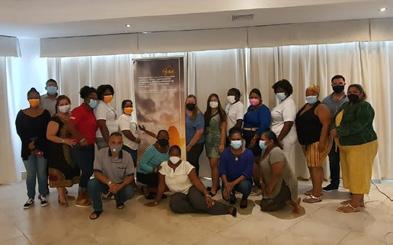
Our next step is to provide all transgender women with training on human trafficking.
[...] We have the knowledge, and now we need to empower each and every girl.
- President of the Rainbow Dolls collective
A STORY OF CHANGE
Through its own initiative, Red mujeres Indígenas,* one of the IBCR's partner organisations, mobilised 45 educational centres to work on human trafficking prevention using the tools developed by the project. As a result, the key messages were passed on to some 12,000 students and 250 teachers in eastern Honduras. This unprecedented scope illustrates how the project is succeeding in strengthening the efforts made by members of civil society to raise awareness about human trafficking, provide helpful information and protect vulnerable populations.
INCREASING INFLUENCE AND PARTICIPATION
The project enabled participating organisations to gain a better appreciation of their role as a watchdog and why it's important for protecting the members of their communities. They also learned that they can influence the government institutions responsible for trafficking prevention, victim protection and support services.
Organisations are also increasingly willing to participate in the development of policies related to human trafficking. They are activating and/or reactivating mechanisms at the local and national levels to protect key segments of the population and support victims.
» Each organisation designed an action and prevention plan that provided for awareness-raising activities and advocacy with governmental bodies
African descent
40 • IBCR ANNUAL REPORT • 2021-2022
Workshop with members of communities of
* Indigenous Women's Network
» 8 videos were created, with input from civil society, to relate the reality experienced by certain populations and for use in institutional training courses
96 % of the participants from at-risk communities said the training helped them improve their social monitoring skills.
[…] I feel deeply committed to my Garifuna people to let them know what human trafficking is, that it exists and where to go for support.
SUPPORT FOR COMMUNITY INITIATIVES
In order to strengthen the actions carried out as close as possible to vulnerable populations, the Bureau provided technical and financial support this year to two innovative projects implemented by partner organisations: the Centre for Women's Studies in Honduras (CEM-H) and the Unit for the Integral Development of Women and the Family (UDIMUF).

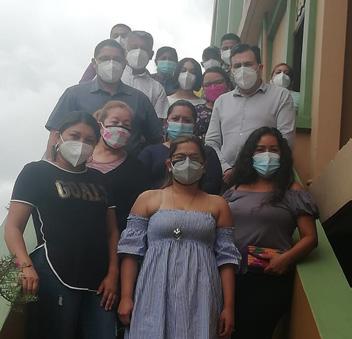
Community analysis, roundtables, training, plays, mobile applications, national campaigns... the actions carried out within the framework of these projects have taken various forms and have made it possible to raise awareness, inform and open dialogue on human trafficking among more than 2,000 people, including women, community leaders and people from the indigenous peoples of Honduras.
Through these initiatives, the project's partner organisations have appropriated the tools and training designed for them within the framework of the project in order to disseminate them more widely and in innovative ways to the communities they represent.
One of the project's main achievements was that it has empowered women in the targeted communities [...]. They generally believed that human trafficking is just an international issue and that it didn't affect their communities. […]
- UDIMUF member
IBCR ANNUAL REPORT • 2021-2022 • 41
- Woman of African descent who participated in the project workshops
From top to bottom:
› Ownership workshop on training for indigenous peoples
› Performance of the play "El vuelo de una monarca", created by the CEM-H with the support of the IBCR
SENEGAL / 2020-2025
Xalé Sama Yité : The child, our top priority
// Combating child sexual and gender-based violence //
In Senegal, children, and girls in particular, continue to face sexual and gender-based violence despite the State's declared will to eradicate such violence. To support the efforts undertaken, the International Bureau for Children's Rights, together with its partners, UNICEF and Global Affairs Canada, is continuing its efforts this year and putting its expertise at the service of professionals and children to enable them to better understand, identify and protect themselves from such violence.

THE PROJECT
The IBCR aims to reduce sexual and gender-based violence against children, especially girls, by:

• Increasing the professionalisation of key child protection actors, including members of security forces (police and gendarmerie), the judiciary, the prison system and the social services sector
• Strengthening children's autonomy and the role they play in combating violence and defending their rights, both individually and collectively
42 • IBCR ANNUAL REPORT • 2021-2022
Project conducted with the technical and financial support of Global Affairs Canada and UNICEF
© Freepik
HOW?
J Reinforce professional practices in the targeted institutions and make sure they respect child rights by defining internal or multi-sectoral procedures and by clarifying each actor's roles and responsibilities with regard to victim support.
J Train personnel (current and future) on sexual and gender-based violence so that they are equipped to uphold children's rights and provide appropriate support during their interventions.
J Provide training and tools for children so that they can learn about their rights and develop leadership in preventing and responding to violence; and also promote children's viewpoints and child participation in addressing violence.
A BETTER UNDERSTANDING OF CHILD PROTECTION IN SENEGAL

A situational assessment of Senegal's child protection system was conducted, shedding light on the causes of child abuse, the inherent challenges in its eradication and possibilities for change. The analysis also provided insights on the project's targeted sectors, including their strengths, weaknesses and opportunities to strengthen them. This information will enable the IBCR to ensure the project's activities are aligned with actual needs and are appropriate for the various contexts.
» 222 children and 368 women and men were consulted during the situational assessment
» Activities took place in three cities: Dakar, Saint Louis and Fatick
The IBCR usually makes a point of translating the names of its projects into the language of the country in which the project takes place. This reflects the IBCR's desire to adapt its activities to the realities of each country, and to ensure participants understand the project and its objectives in order to encourage their mobilisation.
This is why, following discussions with the project partners, the project is now called "Xalé Sama Yité," which means "The child, our top priority" in Wolof. A logo was created to represent the project and its new title.

// New this year //
© AdobeStock / nateejindakum
Combating sexual and genderbased violence is a high-stakes battle [...] It makes sense to equip people with the skills they need to effectively address the challenges they encounter. […] to reach a point in which children's rights are respected in all situations.
- Ciré Lo, Director of Cabinet, representing the Ministry of Women, Family, Gender and Child Protection at the launch of the situational assessment exercise, Dakar, December 2021
IMPROVED TRAINING ON CHILD ABUSE AND GENDER EQUALITY FOR PROFESSIONALS
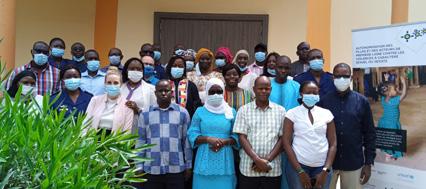
Workshops promoted valuable discussions and helped increase awareness of gender-based stereotypes and the need to deconstruct them in order to prevent discriminatory practices.


» 8 workshops were organised
» 2 procedural handbooks are being developed (one for security forces and the other for legal professionals) to facilitate service coordination
The projects results include:
83 %* of participants now understand their role and that of the other actors involved in responding to cases of sexual and gender-based violence, compared to 42% before the project began
44 • IBCR ANNUAL REPORT • 2021-2022
Workshop for the validation of the situational assessment by a committee of children, Dakar, September 2021
Validation workshop of the situational assessment, Saly, September 2021
Exercise on the trajectory of child victims of violence in the framework of the situational assessment, Dakar
85 %* of participants now say they are sensitive to gender equality issues, compared to 44% at the beginning of the project
71 %** of participants believe they possess the skills required to implement child-friendly practices, compared to 36% at the project outset
* Activities related to procedural development
** Activities related to training
Certain mentalities have been deconstructed and we have a clearer understanding of gender-based violence. [...] For example, some people thought that only girls could be victims of rape. [...] Now, complaints made by boys are taken much more seriously.
- Member of the Ministry of the Interior, March 2022
EMPOWERING CHILDREN TO PREVENT AND COMBAT CHILD ABUSE
The community organisations that partnered with the project have updated the practices to give children greater opportunities to participate, understand their role and express their opinions.

Meanwhile, the children involved in the project are now able to recognise sexual and gender-based violence and know how to respond if they experience or witness these abuses.
98 % of the children who participated in the project's activities say they feel better prepared to protect themselves and take action in the event of violence
91 % dof the girls and boys who participated in the project report having good leadership skills
From top to bottom and from left to right:
› Workshop with the social sector, Dakar, December 2021

› Workshop on developing procedures for the justice sector, Dakar, December 2021
› Workshop with the security forces, Saly-Mbour, June 2021

IBCR ANNUAL REPORT • 2021-2022 • 45
» 85 children were involved in the project through the advisory committees in Dakar, Saint-Louis and Fatick




» 8 workshops were held with children
» A comic book was developed for children, summarising the analysis of Senegal's child protection system
STORY OF CHANGE: MOHAMED*, 17 YEARS OLD
The project gave children the opportunity to view themselves as monitors and watchdogs, and to address their specific needs.
- Member of the association Femme enfance environnement, March 2022
Mohamed sits on the project's advisory committee in Saint-Louis. While talking to a friend, Mohamed realised that he has experienced physical abuse. Wanting to report the situation, he contacted one of the project's local partner organisations. It first offered his friend protection and then initiated mediation and legal proceedings to prosecute the perpetrator. Mohamed continues to work on raising awareness about child rights among his peers and he encourages youths to promote the issue, in particular using videos on social networks.
"The project helped bring out my leadership skills. There's no doubt! [...] I usually end up explaining the project to [students]. I help them understand what it's all about and it gives them the chance to share their views on the subject."
* The child's name has been changed to protect his identity.
46 • IBCR ANNUAL REPORT • 2021-2022
Children's advisory committees in September and October 2021, in Saint Louis, Dakar and Fatick respectively.
© Pixabay
FACILITATING
DIALOGUE BETWEEN THE STATE AND COMMUNITIES
Dialogue was initiated between community organisations and local actors such as the police, the justice system and the prefecture. Improved communication between these key groups is essential for successfully combating child abuse.
The children who participated in the project issued recommendations to government actors and will participate in meetings of the Saint-Louis Child Protection Committee.
The IBCR has taught us that children have a voice. If we want to take good care of them, we must ensure children are heard, involved and trusted.
- Member of the Ministry of the Interior, March 2022
From top to bottom:
› Event organised by the project partner NGO Eden on the occasion of the Day of the African Child on 16 June 2021, Dakar

› Panel organised by the Association of Women Lawyers of Senegal, a project partner, on the occasion of Universal Children's Day on 20 November 2021, Dakar
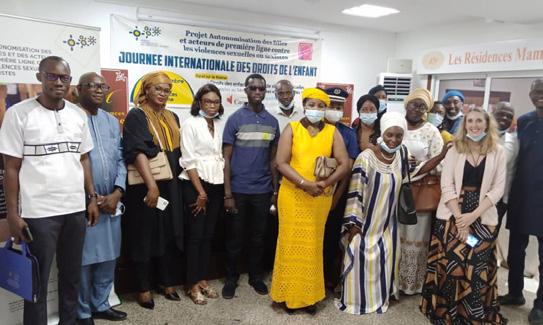
IBCR ANNUAL REPORT • 2021-2022 • 47
BURKINA FASO / 2021-2026
Biig yi neere , a life without violence

Burkina Faso still has a long road ahead on its journey to achieving gender equality, especially in the area of child abuse. Girls are more likely to be victims of physical, sexual, gender-based or psychological violence. They struggle to escape unbalanced and discriminatory gender relations, educational traditions and social norms. The humanitarian crisis in many parts of the country and the recent pandemic have made children more vulnerable to violence, as some find themselves cut off from essential protection services.
Even though Burkina Faso's government has made efforts to address this issue over the past several years, a significant gap persists between legislation and the practices used to deal with children, which sometimes are in violation of their rights. Building on a past project in Burkina Faso from 2015 to 2021, the IBCR has renewed its commitment to supporting the country's authorities in their efforts to improve child protection. A new five-year project (2021-2026) is now underway, thanks to support from Global Affairs Canada. Conducted in collaboration with the Government of Burkina Faso, it aims to consolidate gains in children's rights and specifically focuses on reducing sexual and gender-based violence.
Project carried out
THE PROJECT
To reduce sexual and gender-based violence against children, and especially girls, in Burkina Faso over a five-year period, the IBCR aims to:
• Increase respect for children's rights and promote child-friendly practices among state actors involved in preventing and combating child abuse. In particular, efforts will focus on defence and security forces (police, gendarmerie, armed forces and child protection brigades), the justice system (members of the judiciary and prison guards), the social services sector, educational services and schools.
• Strengthen child protection at the community level and improve community coordination with state institutions.
• Empower children by fostering their leadership and mobilising them in the fight against violence in all its forms.
HOW?
J Establish procedures to clarify each actor's role and responsibilities in preventing child abuse.
J Create training for personnel working in the targeted sectors so that they can develop the skills they need to provide appropriate, child-friendly interventions.
48 • IBCR ANNUAL REPORT • 2021-2022
© Unsplash / zach lucero
J Develop training courses and tools so that child protection networks and community organisations can expand their knowledge and skills for preventing child abuse and providing assistance to victims.
J Create spaces for dialogue, promote collaboration and facilitate coordination between the various actors and sectors involved in the project, including children.
J Develop tools, training courses and opportunities for children to develop their leadership skills, understand their rights, and learn how to identify cases of abuse, how protect themselves and how to respond if abuse occurs.
// New this year //
GAINING A BETTER UNDERSTANDING OF THE NATIONAL CONTEXT
The best way to understand Burkina Faso's child protection system, and particularly the actors involved in cases involving sexual and gender-based violence, is to study the various sectors targeted by the project. The findings of this analysis will be compiled in a situational assessment report that describes the system's strengths, weaknesses and possible areas for improvement.
The project was given a name in mooré: "Biig-yi-neere", which translates as "For the well-being of the child". Having a name in one of Burkina Faso's national languages will help anchor the project in the country, promote understanding of its objectives and commitment of the stakeholders in its implementation and foster its recognition by the population.


Dialogue was initiated with members of community-based child protection networks and civil society to gain a better understanding of their roles in the child protection system and existing synergies with state actors.
» 376 people were consulted as part of an analysis of the country's child protection system, including 190 children (80 boys and 110 girls) in 6 cities: Koudougou, Kaya, Ouagadougou, Ouahigouya, Dédougou and Bobo Dioulasso
IBCR ANNUAL REPORT • 2021-2022 • 49
Data collection workshops for the situational assessment of Child Protection in Burkina Faso, December 2021-February 2022
MOBILISING PARTNERS
Partnerships were strengthened with the ministries responsible for each of the sectors affected by the project. Getting them on board will ensure activities run smoothly and with proper support.
New partnerships were initiated with 7 community organisations, which will work alongside the IBCR to empower children to defend and demand respect for their rights.
CLARIFYING PROCEDURES
The role and responsibilities of all individuals who support child victims of violence within the justice system were clarified thanks to the definition of a procedure for the justice sector. The procedure also establishes how to provide child-friendly services.
In addition, clarifications were made to the procedure for referring cases of sexual and gender-based violence in crisis situations. The procedure describes the roles of the various protection units and community organisations, and what they do at each stage. A summary of this content will be included in a specially created guidebook.
67 % of child protection workers and civil society members who participated in the project say they now know what role they play in preventing violence against girls in emergency situations
In general [...] the activity allowed to raise issues related to child protection. Understanding the problems is the first step in finding a solution.
- Participant in development workshop for child protection networks, Koudougou, February 2022

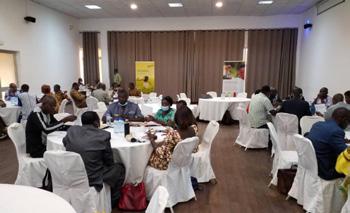
EMPOWERING CHILDREN TO COMBAT VIOLENCE
A Child Advisory Committee was set up, composed of 30 children, including 22 girls. It is responsible for making sure the project is implemented properly and for participating in certain project activities.
Currently, the project team is collaborating with community organisations to develop an action plan
50 • IBCR ANNUAL REPORT • 2021-2022
Project framing workshop, Ouagadougou, July 2021
for empowering all the child participants defend their rights and fight violence.


A project logo is also being created with input from children so that it reflects their understanding of the project and the issues involved.
»12 children, including 7 girls, helped define the project logo at a drawing workshop


As long as we now know the difference between sexual and gender-based violence, we can say no to many forms of violence and explain them to our comrades who don't know much about them.

IBCR ANNUAL REPORT • 2021-2022 • 51
- Child participating in the logo workshop, December 2021
Graphic proposal of a logo for the project, created by a group of children, Ouagadougou, December 2021
Workshop to develop a procedure on sexual violence in the context of a humanitarian crisis for child protection networks and civil society organisations, Koudougou, February 2022
Workshop on the development of procedures to support child victims of sexual and gender-based violence for the justice sector, Koudougou, March 2022
WORLDWIDE / 2020-2027
PRIDE: International Volunteering for Children's Rights
PRIDE, the IBCR's international volunteering programme, is now entering its second year. As part of Canada's Voluntary Cooperation Program (VCP), PRIDE aims to improve human rights, children's rights and gender equality in 11 countries. The project enables Canadian professionals to share their expertise with community organisations and government departments that support children's rights in various contexts. These men and women, whose areas of expertise range from child protection to graphic design to project management, volunteer their time to enrich and strengthen partner organisations so that they can fulfil their missions more effectively.
As concerns about the global pandemic subside, international volunteering has resumed. This year, 26 people travelled abroad to share their expertise with our partners.
The progress made as a result of their contributions is summarised below.
THE PROJECT
To defend the rights of the poorest, most marginalised and vulnerable people, especially women and girls, in 11 countries, as a means of improving their social well-being, the IBCR will work over a 7-year period to:
• Improve respect for children's rights, gender equality and the inclusion of vulnerable groups at the national level by strengthening the capabilities of partner organisations and particularly by aiding with the implementation of innovative initiatives

• Encourage Canadians to get involved in global issues, international development and children's rights in order to spark change within Canada and beyond.
HOW?
J Deploy more than 250 qualified volunteers for periods ranging from a few days to several months and match them with partner organisations that could benefit from their expertise and experience in order to promote and defend human and children's rights.
J Promote the sharing of knowledge, skills and best practices between actors at all levels of the child protection system in a given country.
J Promote innovation in the field of children's rights and gender equality through the creation of a Social Lab, where project
52 • IBCR ANNUAL REPORT • 2021-2022
©AdobeStock/WavebreakMediaMicro
partners can collaborate, share ideas and work together to implement innovative approaches and initiatives.
J Raise awareness among Canadians, through special events and campaigns, about current issues affecting children's rights and how they can take action to address these issues.
// New this year //
26 volunteers, including 19 women, were deployed to 11 countries
66 publications on children's rights and gender equality were disseminated
7 events were held to raise awareness in Canada about volunteer experiences and children's rights issues in partner countries
More than 2/3 of the Canadians who volunteered through PRIDE renewed their contract
92 % of PRIDE volunteers say they came away with a deeper understanding of children's rights and gender equality
// Volunteer support led to the following results //
99,221 people, 86% of whom are women and children, have improved their skills in children's rights, organisational management, project management, communication, etc.

4,683 people from vulnerable communities, of whom at least 69% are women and children, improved their knowledge of children's rights, gender equality and the inclusion of marginalised populations
430 members of partner organisations say they feel better equipped to promote and protect children's rights
31 initiatives to promote child rights and gender equality were launched by our partners
74 % of our partners say they have adopted more effective and child-friendly practices (including management methods)

IBCR ANNUAL REPORT • 2021-2022 • 53
Project carried out
PROMOTING REGIONAL CONNECTIONS
In addition to providing individual support to partner organisations, PRIDE aims to foster collaboration between child protection actors at the national, regional and international levels. This collaboration materialised in various ways this year:
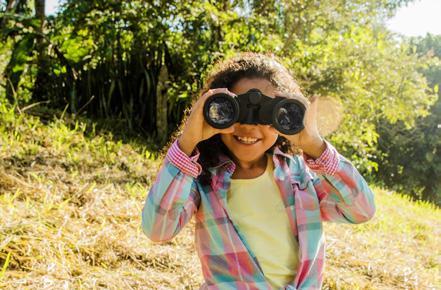
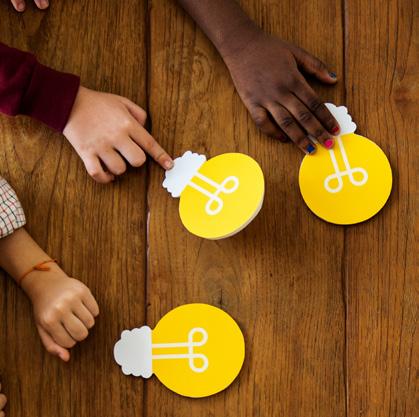
• Partners from Colombia, Honduras and Peru came together for a volunteer-facilitated workshop on strategic communications and how it can spark behavioural changes and encourage people to promote children's rights.
• GENFAMI in Colombia and the Paniamor Foundation in Costa Rica initiated a collaborative process that falls under the international communications campaign "For a life without violence."
They are also co-organising the 6th Meeting on Child, Early and Forced Marriage and Unions in Latin America. The two organisations decided joint initiatives could help them reach broader audiences, thereby expanding protection for atrisk populations.
A SOCIAL LABORATORY TO PROMOTE KNOWLEDGE-SHARING AND INNOVATION
This year, the PRIDE project launched its Social Lab. It's a community space where partner organisations can share ideas and best practices, and discuss opportunities for collaboration and learning. By bringing civil society and state institutions together, it aims to mobilise key child protection actors around common issues. Ultimately, the goal is to foster innovative solutions and contribute to a world in which all children can exercise their rights.
The initial workshops of the Social Lab aimed to forge ties between the participating organisations. The first collaborative effort involved an analysis of the major child rights issues in each country, with a view to identifying common problems and then defining clear objectives for change. The partners from each country agreed on which priority themes the Social Lab should address to create an environment in which the country's children are able to exercise their rights and live free of violence. These themes included the promotion of children's rights and participation, sexual and reproductive education, gender
54 • IBCR ANNUAL REPORT • 2021-2022
© Freepik
Social Laboratory workshops respectively, from top to bottom, in Dakar, Senegal (March 2022), Colombia (November 2021) and Peru (January 2021).



equality, justice for children and fight against child labour, sexual and gender-based violence.
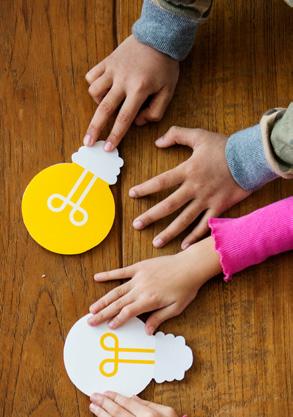
The next step will be to develop the innovative solutions, tools and synergies needed to drive change.
A STORY OF CHANGE: NEW DUAL-DIPLOMA PROGRAMME
COMETA and CHS Alternativo, PRIDE's two partner organisations in Peru, have joined forces and developed a specialised training programme on the criminological, legal and social aspects of sexual abuse and violence from a gender perspective. Developed with state and academic support, this training course will be given to 500 child protection professionals in Peru.
This collaboration demonstrates PRIDE's ability to foster national collaboration beyond the actions undertaken.
IBCR ANNUAL REPORT • 2021-2022 • 55
© Rawpixel
NORTH AFRICA
BAYTI now has a clear advocacy strategy and promotes child participation to inform its communications efforts. Illustrating this shift, messages to raise awareness about child rights were developed by children involved in the association this year.
The Amane Foundation adopted a policy on the prevention of sexual exploitation and abuse, which led to strengthened capabilities for its personnel. The policy development process gave their team the opportunity to discuss the topic, cast light on gender inequalities, identify inappropriate behaviours and establish best practices for addressing abuse cases.
MOROCCO
OUR PARTNERS: BAYTI ASSOCIATION, THE SUPPORT ASSOCIATION FOR THE CHILD PROTECTION UNIT – CASABLANCA, AND THE AMANE FOUNDATION FOR CHILD PROTECTION.
Three volunteers were deployed, specialising in communications, philanthropy, organisational management, monitoring and evaluation.
Children from the Amane Foundation, as part of an awareness-raising activity on the occasion of World Day Against Child Labour, Taroudant, Morocco, June 2021


56 • IBCR ANNUAL REPORT • 2021-2022
TUNISIA
OUR PARTNERS: ADO+, THE OFFICE OF THE CHILD PROTECTION GENERAL DELEGATE, AND THE TUNISIAN FORUM FOR YOUTH EMPOWERMENT.
Five volunteers were deployed, specialising in child rights, monitoring and evaluation, and advocacy.
ADO+ educators are now better prepared to teach youth, and particularly girls, about their rights thanks to the specialised training they received.
In addition, ADO+ documented best practices in child participation in a handbook that other organisations can use to support their activities.
Now that I've completed the training, I will be able to teach [children's rights] using innovative facilitation techniques, engaging activities and fun games. I'm also more familiar with the Convention on the Rights of the Child
- ADO+ member who took the training course
The activities created opportunities to cultivate tolerance and mutual understanding between migrant youth and young Tunisians. Participants were able to share their culture and experiences while learning about the rights of migrants.
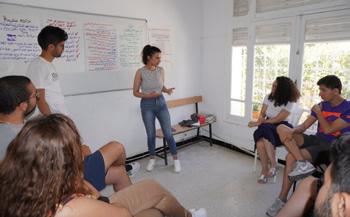
- Tunisian Forum for Youth Empowerment, February 2022
The Tunisian Forum for Youth Empowerment is now more attuned to the issues faced by migrant children and includes these children in its programmes and activities, which is novel in Tunisia.
Stronger ties were forged between Tunisian civil society and the state actors responsible for child protection through a number of joint events. The hope is that this will lead to more coordinated efforts.
The Office of the Child Protection General Delegate revised its practices to make them more childfriendly. This followed an analysis of the key issues faced by delegates when assisting children and seeing to their protection, as well as the proposal of concrete solutions tailored to the Tunisian context.
Dialogue was initiated with communities to deconstruct the taboos that hold back adequate awareness and prevention of sexual abuse, particularly within families. This is creating a safer environment for Tunisian children.

IBCR ANNUAL REPORT • 2021-2022 • 57
The teenage members of ADO+ participated in several thematic workshops led by PRIDE volunteers Nidhal Hlayem and Amal Lajmi, © ADO+
Lara Pocock, PRIDE Regional Manager for North Africa and Madagascar (left in photo) at a seminar organised by our partner the Tunisian Forum for Youth Empowerment, Tunis, May 2021 ©TFYE
SUB-SAHARAN AFRICA BURKINA FASO
Children in conflict with the law now receive better assistance, as awareness and respect for their rights has improved, thanks to clearer internal processes and a new Code of Ethics and Child Protection Policy at CERMICOL.

CERMICOL set up a children's committee so that youths have an opportunity to share their views with management and exercise their right to participation.
CERMICOL also revised its practices and approaches in order to refocus the organisation's mission on education and social reintegration. The procedures for assisting children in conflict with the law were clarified in order to ensure their rights are respected at every step and to increase the likelihood of effective social reintegration.
Staff at the Keoogo Association gained a better understanding of children's rights and needs, and improved their ability to identify cases of sexual and gender-based violence. After attending a series of workshops facilitated by the volunteers, they are now able to assist children more effectively. This means that children experiencing homelessness receive better support and are served in a manner that upholds their rights more effectively.
Various activities were carried out during my assignment and they resulted in [...] a change in the status of youth in conflict with the law. These youths are no longer considered prisoners who should be treated as such. Instead, they are seen as children whose rights must be respected […]
- Fabrice Kazadi,
OUR PARTNERS: ASSOCIATION OF WOMEN LAWYERS OF BURKINA FASO, THE KEOOGO ASSOCIATION AND THE CENTRE FOR EDUCATION AND SOCIAL REINTEGRATION OF MINORS IN CONFLICT WITH THE LAW (CERMICOL).
A STORY OF CHANGE
Thanks to the work of a dedicated PRIDE volunteer, Keoogo and the Association of Women Lawyers have started working together to make sure children receive good social, medical and legal support once they are in the care of either organisation. Keoogo now provides medical care for the children who are referred by the Association of Women Lawyers. Meanwhile, the latter provides legal and judicial support to children who are referred by Keoogo, a change that promises to facilitate the social reintegration of these children.
58 • IBCR ANNUAL REPORT • 2021-2022
volunteer deployed to CERMICOL
Five volunteers were deployed, specialising in child rights, social work and communications.
Visit to a pre-school with Keoogo, Burkina Faso, May 2021
CÔTE D’IVOIRE
OUR PARTNERS: ASSOCIATION OF WOMEN LAWYERS OF CÔTE D'IVOIRE, THE NATIONAL COUNCIL FOR HUMAN RIGHTS AND NGO FORUM.


Three volunteers were deployed, specialising in organisational management, legal consulting, child protection and resource mobilisation.
At the Association of Women Lawyers of Côte d'Ivoire and its clinics in Abidjan, Bouaké, and Daloa, members improved their knowledge of the child protection system and the actors that make it up. This development was thanks to a mapping exercise and a series of training sessions. Consequently, the Association will now be able to collaborate with other child protection actors more effectively, leading to improved protection of child rights.
65 members of NGO Forum are now better equipped to provide gender-sensitive service and promote the participation of girls thanks to the creation of a gender equality policy.
NGO Forum improved its overall organisation and collaboration with members by developing a 2022–2026 strategic plan that clearly sets out its guidelines, objectives, action plan, and the roles and responsibilities of each member. As a result of these improvements, NGO Forum is better equipped to assist vulnerable children and children experiencing hardship.
Going forward, women and girls who experience sexual and gender-based violence will be directed to the right people and units because of a new case management protocol developed by the Association.

IBCR ANNUAL REPORT • 2021-2022 • 59
From top to bottom:
› Training workshop for the NGO Forum team, delivered by Slimane Amansag, PRIDE Volunteer Advisor in Organisational Management to the Forum (3rd from left), Abidjan, June 2021
› Training workshop for the team of the Association of Women Lawyers of Côte d'Ivoire, facilitated by Déborah Marie-Estelle N'Guessan, PRIDE Volunteer Legal and Child Protection Advisor
Child members of the Yopougon Communal Council, during a workshop facilitated by Slimane Amansag, PRIDE volunteer advisor in organisational management at the NGO Forum, July 2021
Organisational structures, procedures and tools were improved for each partner in the country, resulting in increased efficiency and more effective actions to support child protection.
Child participation is now part of these partners' governance and included in their development plans.
CNIDH now offers improved training on children's rights, with a focus on combating child labour and encouraging child participation. The purpose of the training is to increase awareness among vulnerable communities.


MADAGASCAR
OUR PARTNERS: INDEPENDENT NATIONAL COMMISSION ON HUMAN RIGHTS (CNIDH) AND THE CIVIL SOCIETY PLATFORM FOR CHILDREN (PFSCE).
Two volunteers were deployed to share their expertise in organisational management.
The support we received from PRIDE has brought renewed energy to PFSCE. The organisational diagnostic exercise forced PFSCE to examine and rethink its mission, practices, member involvement and overall structure.
- PFSCE Coordination Team
60 • IBCR ANNUAL REPORT • 2021-2022
Activity organised by the PFSCE to celebrate Children's Month, Antananarivo, June 2021. © PFSCE
Nadia Hasimbe, PRIDE volunteer advisor in organisational management at the PFSCE, during a Children's Month activity, Antananarivo, June 2021. © PFSCE
SENEGAL
OUR PARTNERS: ASSOCIATION OF SENEGALESE LEGAL PROFESSIONALS (AJS), EDEN, ENDA JEUNESSE ACTION AND THE NATIONAL SCHOOL FOR SPECIALISED SOCIAL WORKERS.
Six volunteers were deployed, specialising in social work, child protection, organisational management, monitoring and evaluation, teaching, and gender equality.
The partner organisations now give greater consideration to child protection and safeguarding principles when carrying out their work, thanks to specialised training and newly developed policies and tools. ENDA earned a special certification and international recognition for its ability to protect children in vulnerable situations and enforce their rights.
Eden, a non-governmental organisation, developed a protocol for managing cases involving children who have experienced violence. As a result, their case intake and support processes are more child-friendly.

A STORY OF CHANGE
A PRIDE volunteer provided support for the development of a child safeguarding policy and training on the same subject. Her insights helped Eden become more aware of its responsibilities as an organisation that works with children and for children. A change in the mindset and behaviour of Eden's staff was observed, creating a more protective environment for the children the organisation serves.
Eden and ENDA have made the prevention of child sexual exploitation and abuse key concerns for their organisations. They have given consideration to the risks inherent in their activities and developed a policy to reduce these risks.
AJS implemented a monitoring system and created a database so that it can track its performance and adjust its interventions accordingly. This will help the organisation improve the protection and legal support it provides to women and girls who experience violence, abuse or sexual exploitation.
Prior to the sharing session on safeguarding, I didn't realise there was a difference between protecting and safeguarding. Now I know that safeguarding is about responsibility and goes much further than protection.
IBCR ANNUAL REPORT • 2021-2022 • 61
- Member of the permanent secretariat at Eden
Front of the reception centre for children victims of violence of the NGO EDEN, Dakar
The KEKELI Centre has succeeded in diversifying its sources of income. Notably, the organisation held its first fundraising gala and intends to make it an annual event. The centre also developed stronger partnerships, reinforced its capacity to advocate for child protection, and created a communications and mobilisation handbook to gain increased visibility and raise funds to support its operations.
CEJUS has positioned itself as a national centre of expertise in the field of juvenile justice and has incorporated child rights into its core mission. The centre is now able to provide training on children's rights and justice to other organisations across the country.
The WAO initiated a number of studies on child rights violations after developing a guidebook on how to collect information on cases quickly. The organisation's personnel gained a deeper understanding of children's rights, enabling them to provide more child-friendly interventions.

Girls at a WAO centre learned about sexual abuse prevention and are now more informed on how to recognise sexual abuse and how to respond, report and cope with incidents.
A public workshop held jointly by the KEKELI Centre and CEJUS emphasised the importance of child protection and safeguarding the dignity of the child in the interventions carried out by civil society organisations. As a result of this initiative, the issue received front-page media coverage.
TOGO
OUR PARTNERS: WORLD ASSOCIATION FOR ORPHANS (WAO) – AFRICA'S SECTION, KEKELI CENTRE, AND THE CLINIC FOR JUDICIAL AND SOCIAL EXPERTISE (CEJUS).
Three volunteers were deployed, specialising in children's rights, safety, legal advising, communications and engagement.
[the volunteer's support resulted in] improved advocacy strategies to mobilise resources at the national level as well as the organisation of a fundraising gala—a major accomplishment for us.
- KEKELI Centre
From top to bottom:
› Awareness-raising and training session on the theme 'My body and my rights' with girls at the WAO-Africa Hiheatro centre, facilitated by Mahamadi Oubda, PRIDE volunteer advisor on child safety and rights with WAO, Lomé, Togo, June 2021
› Training workshop for the CEJUS team on justice for children, facilitated by Ousmane Diarra, PRIDE volunteer legal advisor in justice for children and children's rights, August 2021

62 • IBCR ANNUAL REPORT • 2021-2022
LATIN AMERICA COLOMBIA
COALICO and its members are now better able to monitor and analyse the negative effects of armed conflict on children, as well as state actions to address the recruitment of children, thanks to the development of materials on the subject. With these improved capabilities, the organisation is also more adequately equipped to carry out advocacy work and, among other things, prepare an alternative report on children's rights in Colombia, which will be presented to the United Nations Committee on the Rights of the Child.
Gender equality is now a priority consideration in the partners' services and procedures, a shift supported by a newly developed gender equality policy at COALICO, the addition of gender-specific information in GENFAMI's tools and interventions, and training at OPAN.
GENFAMI improved its project management capabilities by developing tools for each project phase, including data collection and analysis, planning, monitoring and results assessments.
The partners and other child protection actors in the country are now in a better position to develop mutual connections and collaborate thanks to a mapping of the various actors working to prevent child marriage.
Participants in the International Organization for Migration (IOM) course on the care and support of victims of sexual violence by health professionals, of which GENFAMI designed some modules, March 2022

OUR PARTNERS: THE PASTORAL OFFICE FOR CHILDREN AND FAMILIES (OPAN), THE COALITION AGAINST THE INVOLVEMENT OF CHILDREN AND YOUTH IN ARMED CONFLICT IN COLOMBIA (COALICO) AND THE FOUNDATION FOR THE INTEGRAL DEVELOPMENT OF GENDER AND FAMILY (GENFAMI).
Six volunteers were deployed, specialising in organisational management, legal consulting and regional coordination.
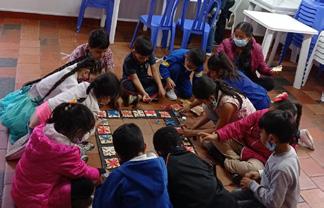
IBCR ANNUAL REPORT • 2021-2022 • 63
OPAN reception centre
The Paniamor Foundation and its initiatives now enjoy better visibility with key population segments due to the development of an institutional communications strategy and improved online presence.
Paniamor now has the skills and knowledge required to develop large-scale communications campaigns, design effective messages for awareness-building and advocacy, share the results of its initiatives and communicate in the media. These improvements stem from new communications tools and training.
Costa Rica's institutions and civil society increased their collaboration and jointly organised a training workshop on how to use strategic communications to create a social impact and promote child rights. The workshop was attended by 7 ministries, 13 state institutions, 6 civil society organisations and 5 public schools from across the country.
COSTA RICA
OUR PARTNERS: THE NATIONAL COALITION AGAINST HUMAN TRAFFICKING AND MIGRANT SMUGGLING (CONATT) AND THE PANIAMOR FOUNDATION.
One volunteer was deployed to share their expertise in strategic communications.
A STORY OF
CHANGE:
FROM A COMMUNICATIONS CAMPAIGN TO PUBLIC POLICY
After receiving support from PRIDE and the volunteer deployed to the organisation, the Paniamor Foundation released a campaign against the corporal punishment of children, sparking substantial media coverage. This prompted the Costa Rican Council for Children to adopt a national policy on corporal punishment and humiliating treatment.

64 • IBCR ANNUAL REPORT • 2021-2022
© COALICO
HONDURAS
OUR PARTNERS: ARCOÍRIS (AN LGBTQI+ ASSOCIATION), THE INTER-INSTITUTIONAL COMMISSION AGAINST COMMERCIAL SEXUAL EXPLOITATION AND TRAFFICKING IN PERSONS (CICESCT), AND THE UNIT FOR THE INTEGRAL DEVELOPMENT OF WOMEN AND THE FAMILY (UDIMUF).
Four volunteers were deployed, specialising in organisational management and communications.
UDIMUF also strengthened its advocacy capabilities by developing an advocacy plan on key issues affecting vulnerable children in Atlántida. The plan was approved by national authorities, who committed to including these issues in the government's action plan.
UDIMUF also increased prevention activities and public mobilisation against human trafficking and in support of children's rights, and sexual and reproductive health. The organisation developed and shared five awareness-raising campaigns.
Arcoíris is now able to share its messaging and promote its activities to a wider audience thanks to a more robust online presence and updated website (refreshed design, new section on the rights of LGBTQI+ children and 10 new videos).
In addition, Arcoíris strengthened its ability to develop training and awareness-raising activities on the rights of children in the LGBTQI+ community, through the creation of an educational toolkit.
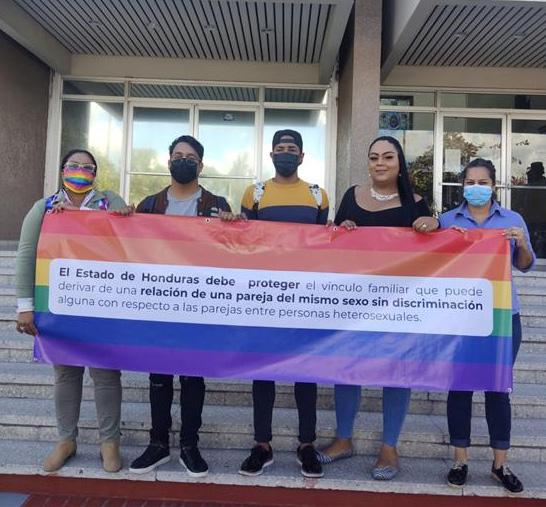
CICESCT strengthened its ability to connect with various audiences and expanded its communication guides and tools on topics such as preparing press releases, using social media, etc.
UDIMUF members are better equipped and trained to effectively track progress on goals and projects. It developed a number of supports, including an established system, a manual and instructional videos.
Key anti-human-trafficking actors as well as justice personnel, community organisations, and women leaders of community networks in the department of Atlántida increased their knowledge on how to assist victims of trafficking by attending various training sessions.
IBCR ANNUAL REPORT • 2021-2022 • 65
LGBTQI+ rights advocacy campaign, Arcoíris Association, Honduras
CHS Alternativo improved its capabilities in the areas of fundraising, planning, monitoring and assessment of its impact by developing specialised tools. The organisation also enhanced its strategic plan by adding the gender-based approach to it.

COMETA is now prepared to step up its outreach activities with vulnerable populations after attending training workshops and adopting educational tools on communication and family ties.
PERU
OUR PARTNERS: CHS ALTERNATIVO (A GROUP SUPPORTING SOCIAL AND ALTERNATIVE HUMAN CAPITAL) AND COMETA (AN ASSOCIATION THAT PROVIDES AID TO CHILDREN AND ADOLESCENTS).
Two volunteers were deployed to share their expertise in organisational management.
66 • IBCR ANNUAL REPORT • 2021-2022
© Pixabay / Sasint
Financial Information
The organisation’s complete financial statements as at March 31, 2022 are available upon request. The audit was conducted by Deloitte LLP.
Children and the justice system Exploitation and violence against children Children and emergency situations Programme development Administration 29 % 44 % 18.9 % 6.7 % 1.4 % Government contributions Contributions from international organisations Private-sector contributions and other sources Municipal contributions 4.6 % 1.1 % 24.5 % 67.9 % 1.9 % Contributed services
REVENUE 2022 2021 Government contributions 4,900,854 $ 3,548,488 $ Contributions from international organisations 333,775 $ 347,505 $ Contributed services 1,767,398 $ 450,860 $ Municipal contributions 76,127 $Private-sector contributions and other sources 139,933 $ 110,133 $ TOTAL 7,218,087 $ 4,456,986 $ Excess of revenue over expenses 90,869 $ 112,393 $ EXPENSES 2022 2021 Children and the justice system 2,063,683 $ 2,007,091 $ Exploitation and violence against children 3,141,217 $ 1,220,708 $ Children and emergency situations 1,347,802 $ 539,465 $ Programme development 100,370 $ 106,598 $ Administration 474,146 $ 470,731 $ TOTAL 7,127,218 $ 4,344,593 $ IBCR ANNUAL REPORT • 2021-2022 • 67
Our valued partners
The IBCR is deeply grateful to the public partners, local partners and granting agencies whose support allows us to continually expand our efforts to promote and protect children's rights around the world.
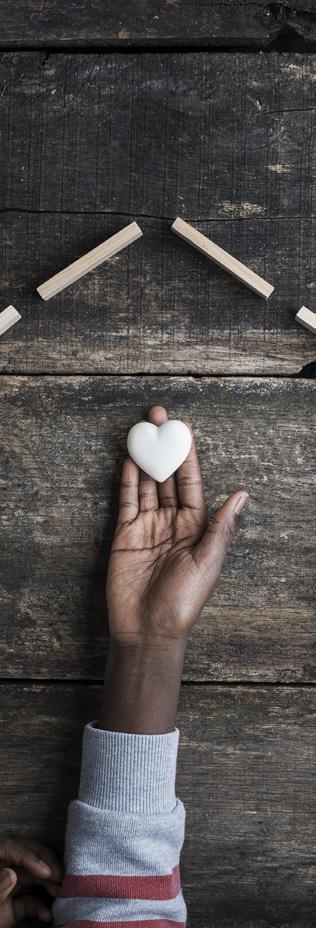
OUR PUBLIC PARTNERS
Global Affairs Canada
United Nations Department of Peacekeeping Operations
Emploi-Québec
Royal Canadian Mounted Police
Gouvernement du Burkina Faso
Gouvernement du Honduras
Gouvernement du Sénégal
Ministère de l'Intérieur Tunisien
Ministère de la Justice du Canada
Quebec Ministry of Justice
Ministère des Relations internationales et de la Francophonie du Québec
Ministère de la Solidarité, du Développement Social, de l’Égalité et de la Famille du Royaume du Maroc
OUR PROJECT PARTNERS
Burkina Faso
Association of Women Lawyers of Burkina Faso (AFJ/ BF)
Keoogo Association
Director of Juvenile Justice (DJJ)
Centre for the Education and Social Reintegration of Minors in Conflict with the Law (CERMICOL)
Canada
Fondation Chamandy
Montréal International
And some 40 Canadian civil society organisations
Colombia
Coalition against the Involvement of Children and Youth in Armed Conflict in Colombia (COALICO)
Foundation for the Integral Development of Gender and Family (GENFAMI)
Pastoral Office for Children and Families (OPAN)
Costa Rica
Paniamor Foundation
Côte d’Ivoire
Association of Women Lawyers of Côte d'Ivoire (AFJCI)
National Council for Human Rights (CNDH)
68 • IBCR ANNUAL REPORT • 2021-2022
© AdobeStock / Gajus
Forum des ONG et Associations d'Aide à l'Enfance en Difficulté
Honduras
Inter-institutional Commission against Sexual Exploitation and Trafficking in Persons of Honduras (CICESCT)
LGBT Arcoíris Association
Unit for the Integral Development of Women and the Family (UDIMUF)
Centre for Women's Studies of Honduras (CEM-H)
Madagascar
Independent National Commission on Human Rights (CNIDH)
Higher Institute of Social Work (ISTS)
Civil Society Platform for Children (PFSCE)
Morocco
Bayti Association
Association d'appui à l'Unité de la Protection de l'Enfance (UPE) Casablanca
Amane Foundation for Child Protection
Peru
Social and Alternative Human Capital (CHS Alternativo)
Commitment from childhood and adolescence (COMETA)
Senegal
Association of Senegalese Women Lawyers (AJS)
Association d'Aide aux Personnes Vulnérables (2APV)
Education and Development of the Child (EDEN)
Enda Jeunesse Action
National School for Specialised Social Workers (ENTSS)
Togo
Legal and Social Expertise Clinic (CEJUS)
KEKELI Centre
World Association for Orphans (WAO) Africa
Tunisia ADO+ Office of the General Delegate for Child Protection (DGPE)
Tunisian Forum for Youth Empowerment
Global Alliance for Child Protection in Humanitarian Action
International Organisation of La Francophonie
Forum international pour le volontariat dans le développement (Forum)
UNICEF
OUR DONORS
Every year, we’re honoured to receive generous contributions from a long list of donors. Thanks to you, we remain confident in our ability to continue defending children’s rights. Your unwavering support makes all the difference!
RELIGIOUS COMMUNITIES
Comité central de partage – Les Œuvres Leroyer
Congregation of Notre Dame
Sisters of the Cross
Fondation Émilie Jauron
Fonds Marie-François
Missionnaires Oblates de Saint-Boniface
Oblates Franciscaines de Saint-Joseph
Petites Soeurs de la Sainte-Famille
Sisters of Charity of St. Louis
Sisters of Providence of St. Vincent de Paul
Sisters of St. Martha of Antigonish
Sisters of Présentation de Marie
Sisters of Jeanne d’Arc Institute
Sisters of Notre-Dame du BonConseil
Sisters of Notre-Dame du Saint-Rosaire
Sisters of Sainte-Anne
Sisters of Sainte-Croix
Sisters of Saint-François d'Assise
Sisters of Saint-Joseph de Saint-Hyacinthe
Ursulines
We would also like to thank those who choose to support our cause anonymously.
IBCR ANNUAL REPORT • 2021-2022 • 69
Our dedicated team

BOARD OF DIRECTORS
Théophane Nikyèma
Chairperson
Emmanuelle Tremblay Vice-Chair
Jean-Claude Legrand Secretary
Darrel Nadeau Treasurer
Ghizlane Benjelloun
Board Member
Roberta Cecchetti Board Member
François Crépeau Board Member (until November 2021)
Joanne Doucet Board Member (until November 2021)
Cisse Mariama Mohamed Board Member
Annick Murphy Board Member (since September 2021)
Luis Pedernera Board Member
Alexia Tye Board Member (since June 2021)
70 • IBCR ANNUAL REPORT • 2021-2022
© AdobeStock / WavebreakmediaMicro
MANAGEMENT COMMITTEE
Guillaume Landry
Director General
(until November 2021)
Martin Causin Director General
(since January 2022)
Mélissa David Director of Finance
Morgane Faber Director of Administration and Human Resources
Cathy Launay-Alcala Director of Operations and Programmes
A NEW CHAPTER FOR THE IBCR
2022 marks the beginning of a new chapter in the history of the International Bureau for Children's Rights, as the organisation welcomes a new executive director.
After 15 years of unwavering commitment to the organisation, Guillaume Landry is handing over the reins to Martin Causin, who previously acted as an IBCR project manager in Burkina Faso and then as the IBCR's regional representative in Africa.
The IBCR extends its heartfelt gratitude to Mr. Landry for his years of dedication to promoting and defending children's rights, and wishes him all the best for his future endeavours.
At the same time, the IBCR extends a warm welcome to Mr. Causin, who is stepping into his new role as the organisation experiences unprecedented growth. His expertise and drive are sure to be put to good use.
The IBCR would like to thank Denisse Araya Castelli and Nadja Furth for their dedicated contributions to the Board of Directors over the past years. Their involvement in promoting and protecting children’s rights has been truly remarkable and it has been a privilege to benefit from their expertise. We wish them the best in their future endeavours.
The IBCR also has the privilege of relying on team of dependable professionals, interns and students who generously offer their time and talent to advancing the cause of child rights around the world.
Thank you to the entire IBCR team for their valuable input in producing this report.
IBCR ANNUAL REPORT • 2021-2022 • 71
ISBN 978-1-989688-35-9
Dépôt légal
HEAD OFFICE
805, rue Villeray, Montréal, (Québec) H2R 1J4 Canada
Tel. + 1 514 932 7656 info@ibcr.org

NATIONAL OFFICES
Burkina Faso - Ouagadougou
Zone du Bois, 03 BP 7041
Tel. + 226 25 36 34 59
Honduras - Tegucigalpa
Boulevard Morazán, Torre Morazán
Torre 1, Piso 12, Oficina 01
Tel. + 504 2203 4730
Senegal - Dakar
Villa Yoff Ranhard, Rue 478
Tel. + 221 33 868 82 60
WWW.IBCR.ORG FOLLOW US
– Bibliothèque et Archives nationales du Québec, 2023
©
/
AdobeStock
singkham


















 - Théophane Nikyèma, chair of the IBCR Board of Directors and member of the Justice With Children Scientific Committee
- Théophane Nikyèma, chair of the IBCR Board of Directors and member of the Justice With Children Scientific Committee






















 © Unsplash
- Participant in the pilot training course
© Unsplash
- Participant in the pilot training course



 Workshop on the integration of the competency-based approach in child protection work, Ouagadougou, Burkina Faso, October 2021
u
Workshop on the integration of the competency-based approach in child protection work, Ouagadougou, Burkina Faso, October 2021
u

 Najat Maalla M’jid, United Nations Special Representative of the Secretary-General on Violence against Children
Najat Maalla M’jid, United Nations Special Representative of the Secretary-General on Violence against Children
































































































